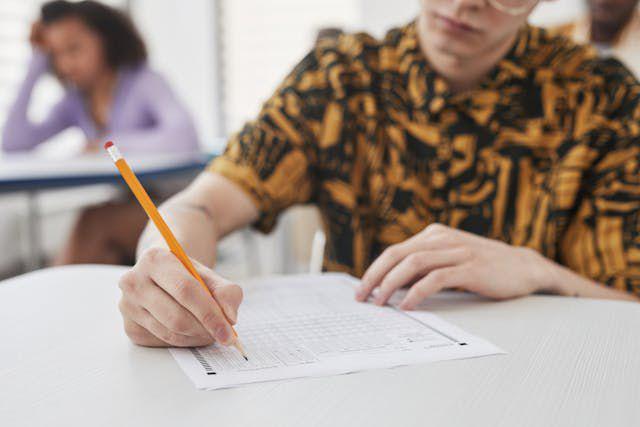Ilustrasi ujian. (unsplash.com/Green Chameleon
Teks ini untuk soal nomer 1-3
Social Media Harms Teen Mental Health
In today’s world, social media is a big part of many teenagers’ daily lives. While it has some benefits, such as staying connected with friends, meeting new people, and learning about interesting topics, it also brings serious problems. I strongly believe that social media harms teen mental health, and we must pay more attention to this issue before it becomes even worse.
First, social media often makes teenagers compare themselves to others in an unhealthy way. When teens see pictures of people who seem perfect, they feel that they are not good enough. These feelings can lower self-esteem and lead to sadness, anxiety, or even depression. The problem is that many of these online posts are edited, filtered, or fake, but teens still feel pressure to look or live the same way. They may think that their own life is boring or not successful, which is simply not true.
Second, too much time on social media affects sleep and study habits. Many teenagers use their phones late at night, checking messages or watching videos, which reduces sleep time and quality. Without enough sleep, teens cannot focus well in class, and their grades may suffer. This can increase stress and worry about the future, making them feel overwhelmed.
Finally, online bullying, or cyberbullying, is another serious danger. Unlike face-to-face bullying, it can happen at any time and be shared with many people. Victims of cyberbullying often feel alone, scared, and helpless, and in some cases, it leads to serious mental health problems.
In conclusion, although social media has some good uses, its harm to teen mental health is much greater. Teenagers need support from parents, teachers, and society to use it wisely. Schools should teach students how to use social media in healthy ways, and parents should guide their children to take breaks and spend time offline. By doing this, we can help protect young people’s mental health in this digital age.
What is the most prominent impression you gain from the text?
A. Social media makes teenagers unhappy because they compare their lives to unrealistic images online.
B. Teenagers should completely stop using social media to protect their mental health.
C. Using social media too much can disturb teenagers' sleep and make it harder for them to focus at school.
D. Cyberbullying is a serious problem on social media and can make teenagers feel lonely and scared.
E. The text explains that social media has only negative effects without any positive sides.
Jawaban: A, C, dan D.
Pembahasan:
A → benar, karena teks menjelaskan remaja sering membandingkan diri dengan gambar tidak realistis sehingga menurunkan kepercayaan diri.
B → salah, penulis tidak menyarankan berhenti total, melainkan menggunakan media sosial secara bijak.
C → benar, penggunaan berlebihan mengganggu tidur dan fokus belajar di sekolah.
D → benar, cyberbullying membuat remaja merasa kesepian, takut, dan tertekan.
E → salah, teks juga menyebutkan sisi positif media sosial, tidak hanya negatif.
Jadi, jawaban yang tepat adalah A, C, dan D.
2. Which statements from the text support the author’s argument that social media harms teen mental health?
A. "When teens see pictures of people who seem perfect, they feel that they are not good enough."
B. "Many teenagers use their phones late at night, which reduces sleep time and quality."
C. "Schools should teach students how to use social media in healthy ways."
D. "Social media helps teens stay connected with friends and learn about interesting topics."
E. "Victims of cyberbullying often feel alone, scared, and helpless."
Jawaban: A, B, dan E.
Pembahasan:
A. "When teens see pictures of people who seem perfect, they feel that they are not good enough." → Benar, ini menunjukkan dampak negatif media sosial pada kepercayaan diri remaja.
B. "Many teenagers use their phones late at night, which reduces sleep time and quality." → Benar, ini mendukung argumen bahwa media sosial merugikan kesehatan mental dengan mengganggu tidur.
C. "Schools should teach students how to use social media in healthy ways." → Salah, ini adalah solusi, bukan bukti langsung bahwa media sosial merugikan.
D. "Social media helps teens stay connected with friends and learn about interesting topics." → Salah, ini justru menyebutkan sisi positif media sosial.
E. "Victims of cyberbullying often feel alone, scared, and helpless." → Benar, ini memperkuat argumen bahwa media sosial dapat menimbulkan masalah kesehatan mental serius.
Jadi, jawaban yang tepat adalah A, B, dan E.
3. What will happen if teenagers have poor sleep quality?
A. Teenagers' grades could drop.
B. Teens struggle to focus in class.
C. Teens are likely to feel stressed.
D. Teenagers will be more confident
E. Teens will become mentally strong.
Jawaban: A, B, dan C.
Pembahasan:
A. Teenagers' grades could drop. → Benar, karena teks menyebutkan kurang tidur membuat nilai mereka bisa menurun.
B. Teens struggle to focus in class. → Benar, disebutkan bahwa tanpa tidur cukup, remaja tidak bisa fokus di kelas.
C. Teens are likely to feel stressed. → Benar, teks menjelaskan bahwa kurang tidur meningkatkan stres dan kekhawatiran.
D. Teenagers will be more confident. → Salah, ini kebalikan dari yang dijelaskan di teks.
E. Teens will become mentally strong. → Salah, karena justru kualitas tidur buruk melemahkan kondisi mental, bukan memperkuatnya.
Jadi jawaban yang tepat adalah A, B, dan C.
